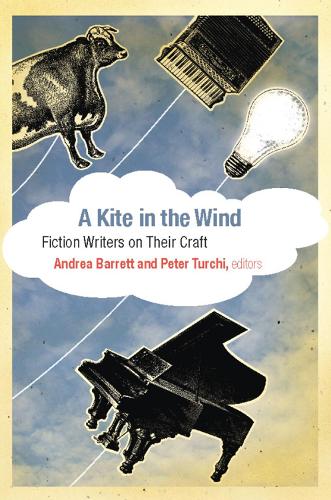
A Kite in the Wind: Fiction Writers on Their Craft
(Paperback)
Publishing Details
A Kite in the Wind: Fiction Writers on Their Craft
By (Author) Andrea Barrett
Edited by Peter Turchi
Trinity University Press,U.S.
Trinity University Press,U.S.
7th June 2011
United States
Classifications
General
Non Fiction
Anthologies
808.3
Commended for IndieFab awards (Writing) 2011
Physical Properties
Paperback
368
Width 152mm, Height 228mm
481g
Description
A Kite in the Wind
is an anthology of essays by 20 veteran writers and master teachers. While the contributors offer specific, practical advice on such fundamental aspects of craft as characterization, character names, the first person point of view, and unreliable narrators, they also give extended, thoughtful consideration to more sophisticated topics, including imminence, or the power of a sense of beginning; creating and maintaining tension; lushness; and the deliberate manipulation of information to create particular effects.
The essays in A Kite in the Wind
begin as personal investigations attempts to understand why a decision in a particular story or novel seemed unsuccessful; to define a quality or problem that seemed either unrecognized or unsatisfactorily defined; to understand what, despite years of experience as a fiction writer, resisted comprehension; and to pursue haunting, even unanswerable questions.
Unlike a how-to book, the anthology is less an instruction manual than it is an intimate visit with twenty very different writers as they explore topics that excite, intrigue, and even puzzle them. Each discussion uses specific examples and illustrations, including both canonical stories and novels and writing less frequently discussed, from the 19th, 20th, and 21st centuries, by both American and international authors.
The contributors share their hard-earned insights for beginning and advanced writers with humility, wit, and compassion. The first section of the book focuses on narration, with particular attention paid to various kinds of narrators; the second, on strategic creation and presentation of character; the third, on some of the roles of the visual, beginning with establishing setting; and the fourth, on structural and organizational issues, from movement through time to the manipulation of information to create mystery and suspense. Contributors include Wilton Barnhardt, Andrea Barrett, Charles Baxter, Karen Brennan, Maud Casey, Lan Samantha Chang, Robert Cohen, Stacey DErasmo, Judy Doenges, Anthony Doerr, C. J. Hribal, Michael Martone, Kevin McIlvoy, Alexander Parsons, Frederick Reiken, Steven Schwartz, Dominic Smith, Debra Spark, Megan Staffel, Sarah Stone, and Peter Turchi.
Reviews
"Some of our very best fiction writers tackle many of the thorniest and most fascinating aspects of storytelling. Thoughtful and serious and wise, this is much more than a how-to book."-- Richard Russo
"Rule number one is when you get a chance to study with a master, you take it. Rule number two is when you get a chance to study a master studying another master, you push Grandma out of the way to take it. This is a rule number two book. Get it, read it, shelve it--along with its companion volumes--next to Nabokov's 'Lectures on Literature' and O'Connor's 'Mystery and Manners.'"-- David Wroblewski
Author Bio
Peter Turchi has written and coedited several books on writing fiction, including Maps of the Imagination: The Writer as Cartographer, A Muse and a Maze: Writing as Puzzle, Mystery, and Magic, A Kite in the Wind: Fiction Writers on Their Craft and (Don't) Stop Me if You've Heard This Before and Other Essays on Writing Fiction. His stories have appeared in Ploughshares, Story, the Alaska Quarterly Review, Puerto del Sol, and the Colorado Review, among other journals. He has received numerous accolades, including fellowships from the National Endowment for the Arts and the John Simon Guggenheim Memorial Foundation. He is a professor of creative writing at the University of Houston.
